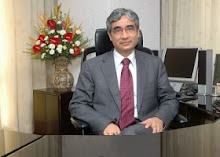FLAME OF HOPE: Members of Hind-Pak Dosti
take part in a candle-light march at the Wagah border
Peace between India and Pakistan has been stubbornly elusive and yet tantalizingly inevitable. This vast subcontinent senses the bounties a peace dividend can deliver to its people yet it recoils from claiming a share. The natural impulse would be to break out of the straitjacket of stated positions and embrace an ideal that promises sustained prosperity to the region, yet there is hesitation. There is a collective paralysis of the will, induced by the trauma of birth, amplified by false starts, mistrust, periodic outbreaks of violence, suspicion, misplaced jingoism and diplomatic doublespeak. Hypnotized by their own mantra, the two states are reluctant to move towards normalization until certain terms and certain promises are kept.
In this perennial season of inertia and zero-sum calculations prejudices continue to fester, stereotypes are entrenched and myth replaces reality. Tragically, opportunity knocks unheard on doors bolted on the inside. Opportunism, that appeals to atavistic passions, elicits an instant response to every single knock. It is one of history’s ironies that a people who share so much, refuse to acknowledge their similarities and focus so avidly on their differences. We believe it is time to restore the equilibrium. Public opinion is far too potent a force to be left in the hands of narrow vested interests. The people of today must find its voice and force the rulers to listen. The awaam must write its own placards and fashion its own slogans. The leaders must learn to be led and not blindly followed. Skepticism about the given is often the genesis of faith. This skepticism has been brewing. It can be unleashed to forge a new social compact between the people of this region. A social compact based on a simple yet powerful impulse — Aman ki Asha. A desire for peace.
The media in India and Pakistan speaks directly to the hearts and minds and stomachs of the people. It can help in writing a final chapter, adding a happy twist to a story that seemed headed for tragedy. It can do so by shaping the discourse and steering it away from rancour and divisiveness. It has the maturity to recognize the irritants and obstacles to peace and will not take a timid stance towards the more intractable and contentious issues — whether relating to Kashmir, water disputes or the issue of cross-border terrorism. It can offer solutions and nudge the leadership towards a sustained peace process. It can create an enabling environment where new ideas can germinate and bold initiatives can sprout. The media can begin the conversation where a plurality of views and opinions are not drowned out by shrill voices. It can cleanse polluted mindsets and revive the generosity of spirits which is a distinctive trait of the subcontinent. It can help cool the temperature and wean away the guardians from fortified frontiers. It can argue the case for allocating scarce resources where they are needed the most. It can begin the process of converting swords into plough shares.
The Times of India Group and the Jang Group have come together to energize the process of peace between our two countries. We believe that this is an intervention whose time has come. We recognize that setbacks will occur but these should not derail the process. We will need to reach out and pluck the low hanging fruit in the beginning before we aim higher. Issues of trade and commerce, of investments, of financial infrastructure, of cultural exchanges, of religious and medical tourism, of free movement of ideas, of visa regimes, of sporting ties, of connectivity, of reviving existing routes, of market access, of separated families, of the plight of prisoners, will be part of our initial agenda. Through debates, discussions and the telling of stories we will find commonalities and space, for compromise and adjustment, on matters that have bedevilled relations for over 60 years.
When the two neighbours meet they move almost seamlessly into the shared cultural and human ethos. They talk to each other about food, about music, about poetry, about films, about theatre and about the prolonged absences spawned by lost years. They share anxieties, discuss rising prices, seek advice on their children’s education, gossip about their in-laws, trade anecdotes and laugh at the foibles of politicians. We want to lower the walls so that the conversation continues. We have to nurture the seeds of peace that have nestled, untended, for decades in hostile soil.
We owe our unborn generations the right to rise out of the depths of poverty, and squalour. It is embarrassing to read the statistics confirming our resistance to positive change in the fields of education, health and poverty alleviation. All social indices are stacked against us and will remain so unless we scatter the war clouds that menace our skies. There are external elements at work in the region that thrive on the animosity between the two neighbours. They have a stake in keeping the region in turmoil. We need to combat them by making them irrelevant.
A surge of goodwill and flexibility on the part of civil society and the media will push these forces back by denying them the raw material that manufactures hate.
Our subcontinent needs to follow the footprints left behind by the great poets, sufi saints and the bhakts who preached and practised love and inclusiveness. This is the land of Tagore and Ghalib, of Bulleh Shah and Kabir, of Nanak and Moinuddin Chisti. It is their spirit that will guide us in this journey. The one and half billion people of this region await the dawning of an age where peace, equality and tranquility prevails. This will happen when every heart beats with Aman ki Asha.







wonderful initiative to create peaceful atmosphere among neighbours which will save crores of rupees spent on strengthening security!!!!
ReplyDelete